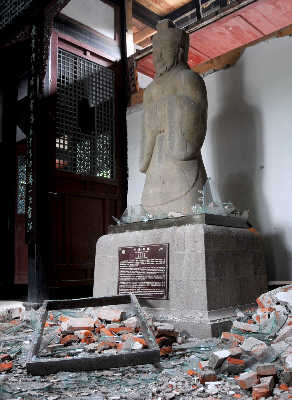
Statue of Li Bing, creator of Dujiangyan irrigation network
Professors at Shanghai's Tongji University are working on plans to repair historic and cultural relics damaged in the Sichuan earthquake.
A systematic protection plan for Dujiangyan's more than 2,000-year-old irrigation infrastructure that was partly damaged during the earthquake, is to be worked out within the next eight days, Tongji officials said yesterday.
"We are going to fix those relics by not only mending the architecture's outer surface. More importantly, we need to correct those with inappropriate anti-earthquake design and find out the ultimate cause of the damage," said Chang Qing, dean of Tongji's architecture department.
Chang flew to the Dujiangyan for an on-site examination about Dujiangyan's condition in Sichuan Province last Thursday. He said the irrigation system's main structure remained complete, although some walls and roofs were damaged.
"It is extremely fortunate to find that a fortification tower group of the Qiang ethnic minority, which was crowned as living fossil of the Qiang culture, is standing still at its original place," Chang said.
It was mainly fake antiques that were destroyed, he added.
Meanwhile, professors have called on the government to set up an architecture damage exploration committee.
"We need a special damage exploration committee to record the earthquake's true damage state as accurately as possible. That will keep precious first-hand material for experts' earthquake research in the future," said Lu Bingjie, Tongji professor of ancient architecture protection.
"This recording job is much more urgent than setting up earthquake museums."
Li Jie, director of the Shanghai Anti-disaster Research Institute, noted that Shanghai also needed to set up its own anti-earthquake and disaster relief plan in case the city was hit by an earthquake.
(Shanghai Daily May 28, 2008)